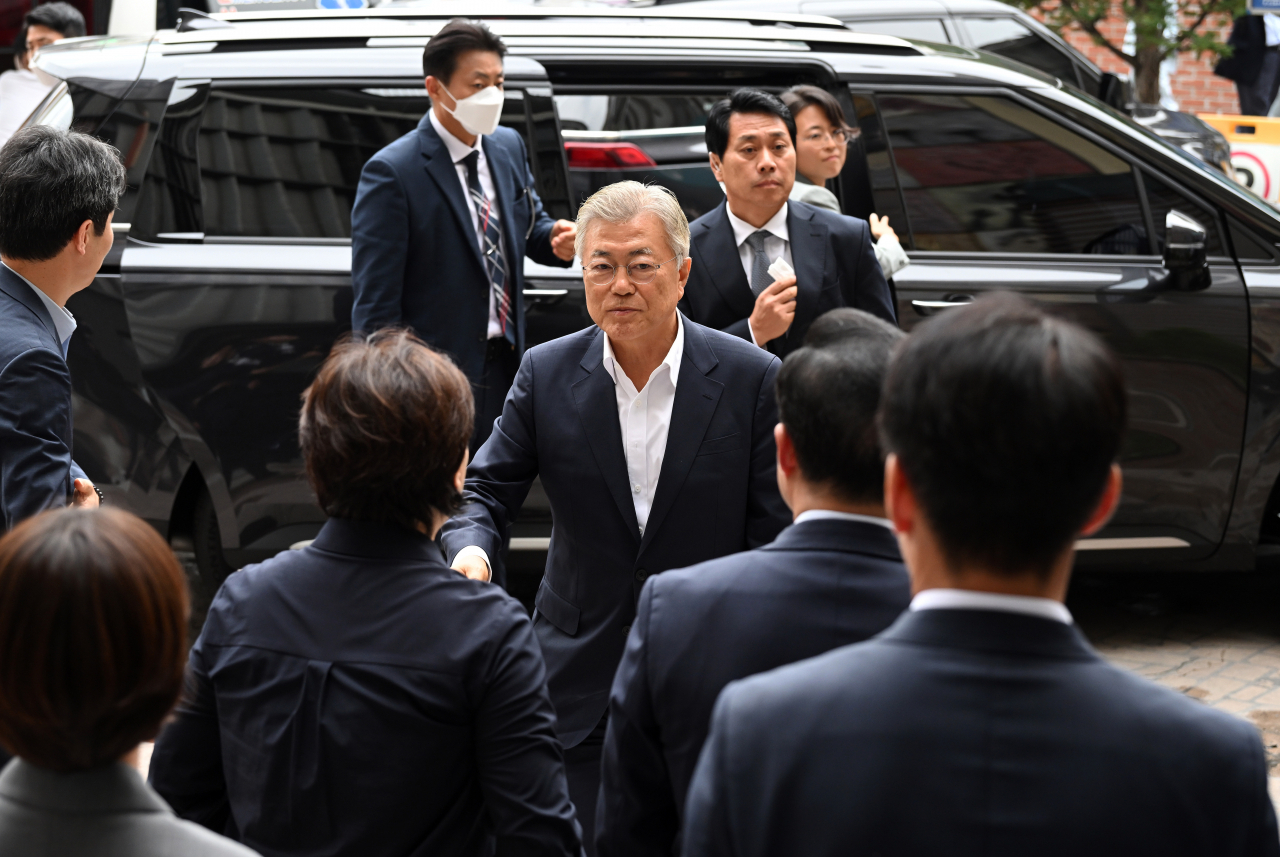Assembly to vote on opposition leader’s arrest warrant after Yoon approval
Moon says liberal administration trumps conservative ones in economy, security
By Kim ArinPublished : Sept. 19, 2023 - 18:01

Another motion for an arrest warrant for Democratic Party of Korea’s leader Rep. Lee Jae-myung, who is in hospital from his 19-day hunger strike, awaits a vote by the National Assembly, possibly on Thursday.
President Yoon Suk Yeol approved the request for the opposition leader’s arrest warrant, which was referred to the Assembly for a vote, his office said Tuesday.
The presidential approval comes a day after Seoul prosecutors filed an arrest warrant request after Lee over three separate counts of accusations. According to prosecutors, he faces accusations that he allowed certain private developers to illicitly profit from a public city development project while serving as mayor of Seongnam. He is also accused of personating a prosecutor and then forcing a witness to testify falsely in court, and of paying North Korean authorities via an illicit route.
The arrest warrant request was submitted on the same day Lee was to hospital early Monday morning after becoming frail from a continued hunger strike that he has been staging since Aug. 31 to protest what he calls Yoon’s “tyrannical rule.” He and the Democratic Party are demanding that the president fire the entire Cabinet to take accountability for the “failures” from his term in office so far.
For the court to begin to review whether to issue an arrest warrant against Lee, a long process is required. As he is an incumbent lawmaker, he is protected from being detained or arrested without a majority consent of the Assembly under the Constitution.
According to the act on the National Assembly, before issuing a warrant to arrest a sitting lawmaker, a court must first submit a request with the government, which then reviews it before handing it over to the Assembly for vote. Once the request reaches the Assembly, the speaker must announce it at the following plenary session, to be put to vote within the next 72 hours.
The first motion for Lee’s arrest warrant in February was discarded in an anonymous vote. The vote split 139 in favor to 138 against, failing to meet the threshold of 149 votes required to pass the motion -- a close call considering the Democratic Party holds 56 percent of the Assembly seats. Nine votes were abstentions and 11 were considered invalid.
On the second day of Lee’s hospitalization on Tuesday afternoon, former President Moon Jae-in of the Democratic Party visited him at a hospital in Seoul, according to Lee’s office.
Rep. Kim Eui-kyeom, who was the presidential spokesperson for Moon, told The Korea Herald that the meeting between the former president and the party leader was expected to “rally support” for the party. On the presidential office or the ruling party not paying an in-person visit, stopping short of written messages of sympathy, he said that he believes such was “Yoon’s intention.” “The president hasn’t sat down with the opposition leader for the last year and a half since assuming office, treating him like some sort of a criminal,” he said.
Moon, who made a first known trip to Seoul on this day, issued a criticism against the conservative administration in office.
In a speech given at a event commemorating the fifth anniversary of the 2018 Pyongyang Declaration, the previous president said that it was a “myth” that conservative administrations are better at handling economy and national security.
“The three liberal administrations under Kim Dae-jung, Roh Moo-hyun and Moon Jae-in fared far better in terms of economy and security,” he said.
He attributed the deficit witnessed over his administration to the COVID-19 pandemic, while the current administration’s, he said, was due to tax reductions for the wealthy.
He said when he took office, he inherited “even more hostile” inter-Korean relations from his conservative predecessor, Park Geun-hye. “But our efforts to initiate dialogue eventually succeeded, and eventually summit talks with Pyongyang were held,” he said.
In an apparent jab at Yoon’s continued push to align more closely with the US and Japan, and away from North Korea and China, Moon said that “ideology politics” hurt balance and could lead to even more losses.
At the event held at a venue in Seoul’s Yeouido near the National Assembly building, Moon and several of his former aides gathered to recognize his administration’s achievements in improving relations with North Korea.



















![[Today’s K-pop] Treasure to publish magazine for debut anniversary](http://res.heraldm.com/phpwas/restmb_idxmake.php?idx=642&simg=/content/image/2024/07/26/20240726050551_0.jpg&u=)